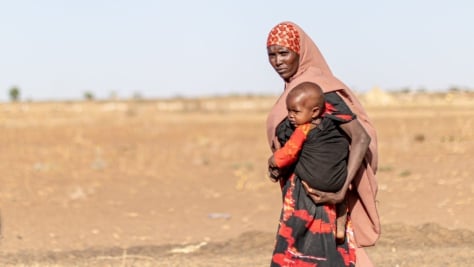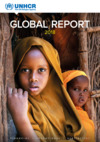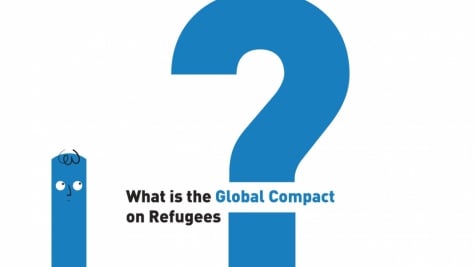Syrian refugee flees all the way to Colombia to escape the violence at home
Ahmed hopes to return to Syria one day but meanwhile is learning Spanish and integrating into life in Colombia
BOGOTA, Colombia, June 24 (UNHCR) - Millions of Syrians have been displaced internally by their civil war or fled abroad, but few have gone as far as Ahmed to escape the violence. Now he is a refugee in Bogota, learning Spanish so he can support himself in Colombia.
Ahmed, aged 25, had a normal life in Syria with a job, a house and friends, but with the arrival of the Middle Eastern protest movement known as the Arab Spring in Syria two years ago, he joined the demand for more freedom.
"When the movement started I could not be just an observer, I could not keep silent anymore and I participated in a peaceful demonstration to fight for more freedom and for more rights," said Ahmed.
The peaceful protests were crushed and changed into the armed conflict of today. With friends in jail or dying at his side and his society disintegrating, he decided to leave. More than 4.5 million Syrians are internally displaced, and about 1.5 million have sought refuge outside Syria, mainly in neighboring countries. There are few cases like Ahmed.*
Carrying a backpack, he took a taxi to the Lebanese border and slipped across the frontier from Syria. From Beirut, he flew off and arrived in Colombia in May 2012.
But life in the Latin America country was more difficult than he had expected and he struggled to survive on his low income. It was in this difficult period that Ahmed met a Syrian who changed his life. The man, who translates for UNHCR and its implementing partner Pastoral Social during interviews of possible refugees, explained the importance of official refugee status.
"I got the refugee status after six months having submitted my application. Now I don´t have to be worried about a visa anymore," he said.
Not knowing any Spanish, it was difficult to integrate into a new society but with the help of Pastoral Social and UNHCR, Ahmed is now learning Spanish so he can find a job and be more independent. He receives a monthly minimum salary of 500,000 Colombian pesos (US$250), of which 60 per cent goes for rent and the rest on food and transportation.
Ahmed keeps in contact with his family via the internet, but even at this distance is careful because his illegal exit for the country might endanger his family. He does not know if his friends are alive.
"Media do not report exactly the situation in my country and around the area . . . but I can assure you that the living conditions of my people are deplorable," said Ahmed. "I was there helping them, as I did some volunteer work for an NGO, and I saw unimaginable things.
"People cannot move, cannot circulate, do not get medicine or food, and controls are more and more restrictive, especially at the border," he added.
Ahmed wants the international community to do more to help displaced Syrians and dreams of one day returning to a different, freer, homeland than he left. But he says no one can know when the fighting will end,
"If Syria continues in this way, we are losing a generation who can contribute to building a new country," said Ahmed, who is one of those educated young Syrians who have taken their skills to other countries where they are appreciated.
*Name changed for protection reasons
By Francesca Fontanini in Bogota, Colombia
Related news and stories
Earthquake survivors in Türkiye count the devastating toll
Twelve years on, Syrian refugees face deepening debt and hunger
Twelve years on, Syrian refugees face deepening debt and hunger
Visiting earthquake-ravaged areas of Türkiye and Syria, UNHCR's Grandi urges more support for survivors trying to rebuild
UNHCR, IOM welcome Spain's expedited resettlement of Syrian refugees from Türkiye in earthquake aftermath
Vital aid reaches Syrian quake survivors who – again – have lost everything
Your search for « colombia syria » matched 688 results. Displaying page 1 of 77 pages.
-

Global Trends
... ... Known as internally displaced people, or IDPs, they account for some 60 per cent of all people displaced. At the end of 2021, Syria, Colombia, the Democratic Republic of the Congo, Yemen, Ethiopia and ...... -

Syrian refugee serves up a taste of home in Colombia
14 Oct 2015 ... BOGOTA, Colombia, Oct 14, (UNHCR) - Before fleeing the civil war in Syria, Almotaz was a student living with his family in Damascus. Now as he builds a new life in Colombia, he is serving up a taste ...... -

UNHCR Global Report 2018
Jun 2019 ... ... Many IDPs were in protracted situations characterized by critical protection and humanitarian conditions. Colombia Syria The Democratic Republic of the Congo 6.2M 7.8M 4.5M 12,088 HQs Gender ...... -
2009 Dialogue: Related Themes
... refugees in urban areas of Jordan, Lebanon and Syria, PDES Evaluation report, July 2009 A tale of ... Protection Protecting the Displaced in Colombia: The Role of Municipal Authorities. Summary Report, ...... -

A New Deal for Refugees
... Basque community opens its doors to welcome family from Syria Bringing toilets into the home boosts refugees' health and security Colombia's private sector begins to open its doors to Venezuelans ...... -

UNHCR's age and gender mainstreaming pilot project 2004: Synthesis report
10 Apr 2005 ... This report is based on eight country evaluations, which took place from January to March 2005 in Colombia, Ecuador, Egypt, Greece, India, Syria, Venezuela and Zambia. Individual country reports are ...... -
UN and International Institutions
... ... Volunteers have worked as part of the UNHCR team in numerous operations, including Afghanistan, the Balkans, Colombia, Ecuador, Iraq, Pakistan, Somalia, Sudan, Syria, Sri Lanka and Timor-Leste. In ...... -

Refugees living in Argentina meet Pope Francis
4 Mar 2019 ... VATICAN CITY STATE - It’s not every day that a person around the world gets to meet the Pope. For four refugees living in Argentina - Okba, from Syria; Diana, from Colombia; Omar, from Venezuela; ...... -

Annual report shows a record 33.3 million were internally displaced in 2013
14 May 2014 ... internal displacement in 2013, reported that 63 per cent of these internally displaced people (IDPs) were from just five countries: Syria, Colombia, Democratic Republic of Congo, Nigeria and Sudan. ......

